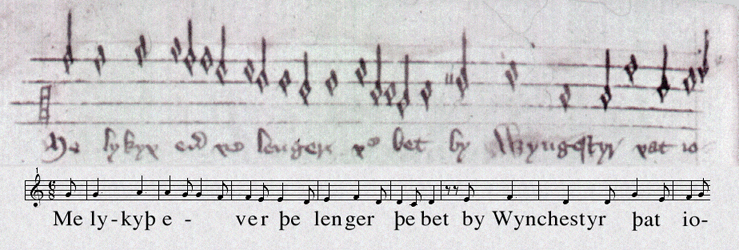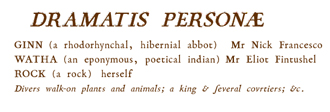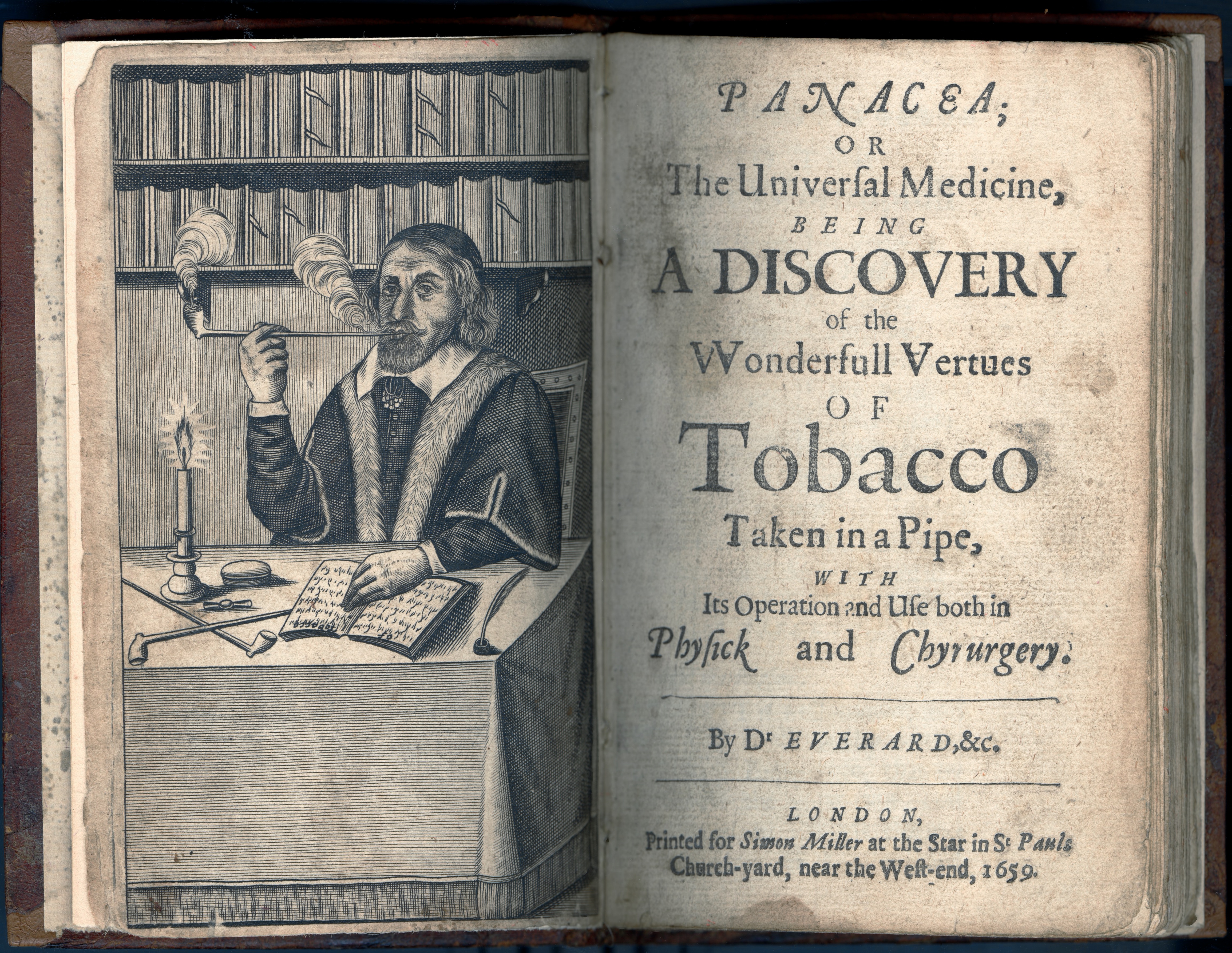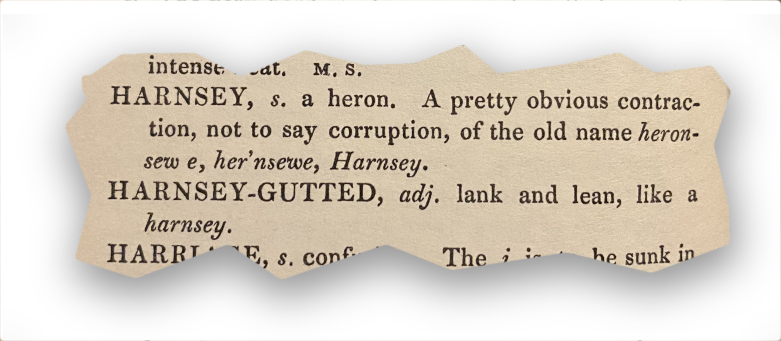Notes:
By abbreviation from SMoE 'aggravation' or 'aggression' with diminutive suffix -o, skinhead etc usage
1. Aggressive or violent behavior. 2. Irritation or exasperation
|
Notes:
I've always thought that it represents the Esturine pronunciation of 'with' though the Wikipedia article on Estury English specifically denies this, so perhaps it is just Cockney or (as these things so frequently are) some sort of hybrid.
|
Notes:
| OE | Old English (~ s.8-s.12) | | ME | Middle English (~ s.11- ~ 1500) | | eMoE | Early Modern English (~ 1450-s.17) | | MoE | Modern English (~ < s.16) | | SMoE | Standard Modern English | | Esturine | MoE Dialect of East London and the Thames Estury | | | |
|
Notes:
vt to berate or to insult someone
|
Notes:
This seems to be a rather playitagainSammy non-quote from East Lynne1 . The nearest thing in the book being
"Crying, sobbing, calling, she flung
herself upon him; she clasped him to her; she dashed off her
disguising glasses; she laid her face upon his, beseeching him to come
back to her, that she might say farewell--to her, his mother; her
darling child, her lost William!"
which isn't really all that close.However there were many versions, both legal and pirated, of the play of the book and "Dead! Dead!" (or "Gone! Gone!") "And never called me Mother" might well be in one of those. It was then picked up by music hall comedians in the early 20th century and used to send up what they saw as hammed up Victorian emotionalism.
|
Notes:
sometimes Radi-ectomyThe more-or-less surgical removal of roots. Save the Cones Fund usage, early s.xxi.
|
Notes:
Not to be confused with Nonbinkleyphones! Thomas Binkley was a seminal figure in the recent history of old music. Someone on the Early Music mailing list once suggested (whilst we were discussing the difficult taxonomy of earlier musical instruments) that classifying them according to whether they were played by Binkly was as good a scheme as any, hence our dichotomy.
|
Notes:
Not to be confused with Binkleyphones! Thomas Binkley was a seminal figure in the recent history of old music. Someone on the Early Music mailing list once suggested (whilst we were discussing the difficult taxonomy of earlier musical instruments) that classifying them according to whether they were played by Binkly was as good a scheme as any, hence our dichotomy.
|
Notes:
This story of their meeting has been in my head for absolute ages, but I have no idea where it came from, nor can I find any reference to it in my books or on the web. Let us say no more than that it ought to be true and if it's not historical then sod history!
|
Notes:
"...people who can write to each other need not necessarily be able to talk to each other at all." A good example of this was in my beginning Japanese class: there were some mamalochen Chinese speakers who could read a surprising amount of Japanese's Chinese derived Kanji.
|
Notes:
"Wireless Essays" Why wireless? It's old-fashioned British usage, that's why. Back in the early days of Radio in Britain curious folk would look in the back of this new-fangled device and see all these wires and would immediately think "Now that looks like it should be called a wireless if anything ever did!" (see the etymology of 'Sleepover').

|
Notes:
Here is a more literal modernization:
Me lykyþ ever þe lenger þe bet
I am always pleased (the longer the better)
by Wynchestyr þat ioly cite.
By Winchester that attractive city
Þe toun ys good & wel yset,
The city center is good and well situated
Þe folk ys cumly on to see.
The inhabitants are of an attractive mien too
Þe ayr is gode boþe yn & out.
The air conditioning is good as is the air quality index
Þe cyte stont bineþ an hylle.
The city has excellent vistas of the adjacent uplands
Þe ryvers rennyþ al about.
There is good access to riverine facilities both for commercial and leisure activities
Þe toun ys rullyd uppe skylle.
No one has yet found out about the Mayor's little peccadillo.
|
Notes:
1. "... presence of his own Absinth" As they say 'Absinth makes the heart grow fonder', ...or is it 'Absinth makes the brain grow blubber'?
|
Notes:
That's RubeGoldbergiform to you Yanks
From the British Artist W. Heath Robinson, the translation being from the American Rube Goldberg
|
Notes:
Museum Britannicum---the British Museum, probably the world's greatest receiver of stolen goods.
|
Notes:
Though you should note that the Americanisation of Richard has not proceeded far enough that he would spell the word with a 'z', nor that he would call that letter anything but 'Zed'.
|
Notes:
"... Anne Catherine Emmerich's Visions Thing" Rather strange stuff, at least to me, Anne Catherine Emmerich seems
to have had a lot of influence on Gibson.
|
Notes:

Obviously thus for safe guarding.
Hey, I tell 'em like I see 'em.
Think yourself lucky that I have been mature enough to avoid any jokes
with the words "head" and "give" in them.
|
Notes:
|
Notes:
Eary, from ear---being in that state in which one can truly say "I'm all ears"; listening closely; (a possible nonceword)
"I not only have hearers but actual listeners! Who pay attention!!! ...these eary people" rhb 2006
|
Notes:
1 it was like something from a remake of Total Recall
|
Notes:
nobody loses all the time
nobody loses all the time
i had an uncle named
Sol who was a born failure and
nearly everybody said he should have gone
into vaudeville perhaps because my Uncle Sol could
sing McCann He Was A Diver on Xmas Eve like Hell Itself which
may or may not account for the fact that my Uncle
Sol indulged in that possibly most inexcusable
of all to use a highfalootin phrase
luxuries that is or to
wit farming and be
it needlessly
added
my Uncle Sol's farm
failed because the chickens
ate the vegetables so
my Uncle Sol had a
chicken farm till the
skunks ate the chickens when
my Uncle Sol
had a skunk farm but
the skunks caught cold and
died and so
my Uncle Sol imitated the
skunks in a subtle manner
or by drowning himself in the watertank
but somebody who'd given my Uncle Sol a Victor
Victrola and records while he lived presented to
him upon the auspicious occasion of his decease a
scruptious not to mention splendiferous funeral with
tall boys in black gloves and flowers and everything and
i remember we all cried like the Missouri
when my Uncle Sol's coffin lurched because
somebody pressed a button
(and down went
my Uncle
Sol
and started a worm farm)
-- E. E. Cummings
|
Notes:
But wait...
It gets much worse...
with Diachronic Ethnodeficiency
|
Notes:

"Wireless Essays" Why wireless? It's old-fashioned British usage, that's why. Back in the early days of Radio in Britain curious folk would look in the back of this new-fangled device and see all these wires and would immediately think "Now that looks like it should be called a wireless if anything ever did!" (see the etymology of 'Sleepover').
|
Notes:
The title Why I Don't Write
|
Notes:
* No that is not an error, and I certainly don't want to discuss it here.
|
Notes:
This is someone's* (and I can't for the life of me remember who's) etymon of Rochester.________________ *Bede of course! My brain must be totally fried.
And now having said that I feel bloody hungry.
|
Notes:
1 The m/s is a genuine, real one (and actually is in CUL--though one can't really say that it's been all that unregarded).
The proper words are:
Me lykyþ ever þe lenger þe bet/by Wynchestyr þat ioly cite./ Þe toun ys good & wel yset,
Þe folk ys cumly on to see./ Þe ayr is gode boþe yn & out./ Þe cyte stont bineþ an hylle.
Þe ryvers rennyþ al about./ Þe toun ys rullyd uppe skylle.
Here is what the whole page of real m/s looks like, and the first line can be interpreted like this: 
Note (particularly on the word 'ever' in this extract , but much worse later in the song) the "smale brekynge" of the notes that so got up John Wyclif's nose.
My modernisation perhaps loses some of the spirit of encomium that graces the original.
2 Here is a more literal modernization:
Me lykyþ ever þe lenger þe bet
I am always pleased (the longer the better)
by Wynchestyr þat ioly cite.
By Winchester that attractive city
Þe toun ys good & wel yset,
The city center is pleasant and well situated
Þe folk ys cumly on to see.
The inhabitants are of an attractive mien too
Þe ayr is gode boþe yn & out.
Many buildings are air conditioned and the air quality index is good
Þe cyte stont bineþ an hylle.
The city has excellent vistas of the adjacent uplands
Þe ryvers rennyþ al about.
There is good access to riverine facilities both for commercial and leisure activities
Þe toun ys rullyd uppe skylle.
No one has yet found out about the Mayor's little peccadillo.
|
Notes:
1 Damned Corracler: This passage is all a reference to the Great Irondequoit Bay Outlet Bridge controversy which was then very busy amongst the populace. The Army Corps of Engineers removed the then existing bridge, just so some damned yacht owners could sail out into the great (and sometimes smelly) Lake Ontario. Some of my in-laws were rather inconvenienced by this evil and affluent act, not of course that I would ever take sides, especially not in one of my essays.
|
Notes:
1 Liberum arbitrium: Thus (probably) getting the drop on Thomas Aquinas by a good 250 years, though it's not at all clear that he differentiated it from voluntas. 2 Ooh! Ooh!! I managed Polyptoton twice in two sentences!* 3 Reconstruction: Due to a limited budget and the fact that even these guys** weren't daft enough, the snow has been left out of the photo. _____________________________
* Bloody Hell and there's a third one---I should give up while I'm still ahead.
** 
|
Notes:
1 2132 Edgemere Drive: Strangely our Grandma Pearl Howard lived in this very spot some centuries later. 2 Had to name: Those of you who know your Tallchap will remember that in his great poem the eponymous Mr Watha had the basic Adamic function of .
|
Notes:
No, what you are thinking of is Onanism and you should be ashamed of yourself because it's from quite a different root. Onomasticism means the practice of naming things.
|
Notes:
At the time this was broadcast moves were afoot to create (or in my reality re-create) a strong elected Mayor.
|
Notes:
I have included some of the slides here, though, somehow, they unaccountably appear to have been left out of the original radio broadcast.
|
Notes:
Not only a formal portrait, but a trick one too, as the 19th child is hidden inside Mrs The Grey.
|
Notes:
That is Leonardo's left, of course, not yours.
|
Notes:
1 Jimmy Olsen
"... gone from being the Jimmy Olsen character" That's not fair! Mr Frisch was a staff writer at the time so it's more like he went from being the Clark Kent character (without, one supposes, the )
|
Notes:
A humorous plural.
VAXen: /vak´sn/, n. [from ‘oxen’, perhaps influenced by ‘vixen’] (alt.:vaxen)
The plural canonically used among hackers for the DEC VAX computers.
“Our installation has four PDP-10s and twenty vaxen.”
|
Notes:
DEC: /dek/, n.
Commonly used abbreviation for Digital Equipment Corporation, later deprecated by DEC itself in favor of “Digital” and now entirely obsolete following the buyout by Compaq. Before the killer micro revolution of the late 1980s, hackerdom was closely symbiotic with DEC's pioneering timesharing machines. The first of the group of cultures described by this lexicon nucleated around the PDP-1. Subsequently, the PDP-6, PDP-10, PDP-20, PDP-11 and VAX were all foci of large and important hackerdoms, and DEC machines long dominated the ARPANET and Internet machine population.
DEC was the technological leader of the minicomputer era (roughly 1967 to 1987), but its failure to embrace microcomputers and Unix early cost it heavily in profits and prestige after silicon got cheap.
Nevertheless, the microprocessor design tradition owes a major debt to the PDP-11 instruction set, and CP/M, MS-DOS, Unix, OS/2, Windows NT were all either genetically descended from a DEC OS, or incubated on DEC hardware, or both. Accordingly, DEC was for many years still regarded with a certain wry affection even among many hackers too young to have grown up on DEC machines.
|
Notes:
Epicenter
"... epicenter" When are you absolute bastards going to realise that 'epi-' is not an intensifier modifying 'center'?
An epicenter isn't a really, really central center, but is merely the point on the Earth's surface that is immediately above (Gk prefix epi-) a subterranean event, like an earthquake.
It's just like that other bloody annoying bit of intense ignorance 'sea-change'.
|
Notes:
Hypocorrection
"... being hypercorrect" If you correctly correct a hypercorrection is that a hypocorrection?
|
Notes:
Walt
"...dear old Walt"
Don't be a twit, Man,
It's Scott not Walt Whitman
|
Notes:
Armed
"... He rode all unarmed" isn't it an interesting comment on humanity how we have got to the modern and transitive 'armed and dangerous' from the old and intransitive 'armed and (therefore) safe'---as in wearing armour!
|
Notes:
Dastard
"... And while we're at it dastard" Apart from presence of rhyme, absence of alliteration and possible ethnicity 'dastard' has little to do with 'bastard' (as in Willie the so-called Conqueror or as I like to call him, with a bit more cultural sensitivity, Vilhjalmr in Bastardr).
I've of course crossed pens with Billy the Bastard before.
|
Notes:
Debride
"... most definitely debrided" and then, as a clincher, consider line 10 from the poem (v.s.) "De bride had consented, de gallant came late:...". I had 'Debride had Consented' as a working title for the essay.
|
Notes:
"...the words are modernized" Actually if I were really going to modernize the thing it would be more like:
"I get a hell of a lot of spam these days that says stuff like:
'want armed man pi11$ & kev1ar ve$t$?---no one need kn0w'"
but you try doing that on the radio!
|
Notes:
"... he axed me to come" Ask could well be the poster-child for metathesis: the sibilant whizzes round the velar plosive so fast that I'm surprised that it doesn't fly off and hit some other word in the i. The joke here (such as it is) is that the Old English form was usually acsian and that it was probably still the dominant one at the time of our tale.
|
Notes:
"...what J.R.R. Tolkein once called (though in different circumstances) Man Food" I'm thinking of the passage
"...man-food as Treebeard calls it. Will you have wine or beer?" Book III, Chapter 9-Flotsam and Jetsam
(The Two Towers: p166 of the Allen and Unwin hardback edn)
|
Notes:
"... sea-change" When are you absolute bastards going to realise that 'sea' is not an intensifier modifying 'change'?
A sea change isn't a really, really big change, but is one effected by the sea.
The phrase is, I assume, a reference to Francis Bac Shakespeare's song from The Tempest "Full fathom five---My father lies! It's only two point eight" or whatever it is that Ariel sings.
It's just like that other bloody annoying bit of intense ignorance 'epicenter'.
|
Notes:
"... the roll-top bureau: there, alone" I might possibly be mis-remembering this quotation. Anyway the original is here
|
Notes:
"...one of its less interesting languages" This is so palpably not true, and I should be (and I am) utterly ashamed of myself for being so carried away with the moment that I could write such rot. ME is a fascinating language as I (who can recite from memory more poetry in ME than I have ever found a willing audience for) should well know.Shame on me! I shall now go and recite the Prologue to the Canterbury Tales "When þat Aprille with his shoures swete þe drought..."
|
Notes:
"... Martin Luther ...or his brother Lex" Lex Luther!... Superman Comix! Duh!!.
|
Notes:
"... paddle my barbed-wire canoe" This section is a play upon the humorously deprecatory phrase, if you will forgive my descent into taboo usage, and since we are all scholars inter pares here, "Up shit creek in a barbed-wire canoe with no paddle"
|
Notes:
"... into adulthood" or in extreme cases into adultery!
|
Notes:
"... ineffable, affable name" Of course I know that the effing name in not ineffable---I just like the phrase!
So there!!
|
Notes:
"... here it is"
...epeita holon ênhekastou tou anthrôpou to eidos strongulon, nôton kai pleuras kuklôi echon, cheiras de tettaras eiche, kai skelê ta isa tais chersin, kai prosôpa du' ep' aucheni kukloterei, homoia pantêi: kephalên d' ep' amphoterois tois prosôpois enantiois keimenois mian, kai ôta tettara, kai aidoia duo, kai talla panta hôs apo toutôn an tis eikaseien. eporeueto de kai orthon hôsper nun, hopoterôse boulêtheiê: kai hopote tachu hormêseien thein, hôsper hoi kubistôntes kai eis orthon ta skelê peripheromenoi kubistôsi kuklôi, oktô tote ousi tois melesin apereidomenoi tachu epheronto kuklôi. ...
Sorry, that was cruel. Here is a link to a site with a pretty full apparatus, but I suppose you just want it Englished.
|
Notes:
In the second place, the primeval man was round, his back and sides forming a circle; and he had four hands and four feet, one head with two faces, looking opposite ways, set on a round neck and precisely alike; also four ears, two privy members, and the remainder to correspond. He could walk upright as men now do, backwards or forwards as he pleased, and he could also roll over and over at a great pace, turning on his four hands and four feet, eight in all, like tumblers going over and over with their legs in the air; this was when he wanted to run fast.
|
Notes:
"... his post-saltic questioning" I suspect that this might be an actual coinage meaning 'after jumping out in a wild and obnoxious manner with the presumed express intention of causing distress in another'
|
Notes:
"... refusing to teach Latin to girls" If you happen to be a mediæval girl, or otherwise missed Latin in School, I suppose I should translate that:'of all creatures women are the best
of which the opposite is the truth'
|
Notes:
"... Testosterone Pride Day" Held annually on the 18th of May for reasons we don't need to go into1. ________________________________
1 Obscure
This, I'm proud to say, is my most obscure reference! And no I'm not going to make it any less obscure.
|
Notes:
Though it might well have been Douglas Adams
|
Notes:
"... we have all those gates!" Of course reality suggests that this use of 'gate' represents the Old Norse gata: street (related to gait) rather than OE gæt, as is appropriate for a town in what was once the Dena lagu, but reality is not as much fun so it can go take a running jump.
|
Notes:
Expatriotism: /eks´paitriotisim/, n. [from ‘ex’, out of and ‘patriot’, a fool] (alt.:ex-patriotism)
Ex-patriotism is that form of homesickness which leaves its sufferers both sick for their far away homes, and at the same time sick of them should they have the misfortune to return to them for a while or, to put it in more explicit and less romantic terms: expatriots are those people who leave somewhere and then spend the rest of their lives saying how wonderful it was back home and how much they regret leaving, though they never do seem to go back much. We should note that expatriots should never be confused with expatriates who merely exhibit some discontinuity between their natality and their locality.
|
Notes:
...and þe yonge sonne
Hath in þe ram his halve cours yronne,
And smale foweles maken melodye,
Þat slepen al þe nyght with open ye
(so priketh hem nature in hir corages) Chaucer: Prologue to Canterbury Tales and the young Sun has passed half-way through the sign of the Ram, and small birds sing and can hardly sleep for excitement.
|
Notes:
pronounced Knee-at-any-ell, and not for one moment to be confused with Nathanial Rochester (whoever he was).
|
Notes:
parritch, porridge noun, formerly frequently treated as a plural, the dish of oats boiled in salted water.
Some say porridge should only be stirred in a clockwise direction using the right hand to avoid attracting the attention of the Devil. The stirring to be done with a straight wooden spoon or stick without a moulded or flat end and known is Scotland as a 'Spurtle' or 'Theevil'.
Porridge should always be spoken of as 'they' and old custom states that it should be eaten standing up. A bone spoon should always be used for eating porridge.
Oats being as Dr Johnson defines them:

|
Notes:
Ahh! the perils of the half-breed!
I am clearly either a Scot and a half or an Englishman and a half, the logic being as follows:---
Each of my parents insists, following ancient tradition, that one of their race is equal to any two of the other.
Thus my composition is either:
one half English plus one half Scottish times two, totalling 1.5
or
one half Scottish plus one half English times two, totalling 1.5
Hence a Sesqui-Scot since that flows so much better than *Sesqui-Englishman.
|
Notes:
To come over all exo-diegetical for a moment the paper actually is from 1659: being a scan of the first (and only) edition of a blank page from this:

|
Notes:
Look at the tongue!
|
Notes:
He wanted to use a skull in a shoot, but the only one he could lay his hands on was used for teaching and had its top cut off. He called on me to round the whole thing off. When it comes to modelling I never know when to leave off, resulting in my photo, which is of course a bit off.
|
Notes:
Unless it's just something I put there to control the lighting...
|
Notes:
Which is EXTREMELY unlikely to be accurate, given the length of time, not to mention my somewhat limited mnemonic skills.
|
Notes:
In the Lower Sixth Form I was cast as the hero of Romeo and Juliet: Mercutio (Duh!)
We had French windows rather than a balcony as such and, during the dress rehersal, Juliet tripped as she entered and Romeo quipped "But, soft! what twit through yonder window breaks"
I'm sure it was a set up, though very funny.
|
Notes:
Ha! Ha! Ha!! sort, a funny compositors' joke, geddit???
|
Notes:
I've only heard it spoken.
Robert Forby The Vocabulary of East Anglia (Vol 2 1830) gives it in the form:

|
Notes:
πρόσωπον (prósōpon, "face") and ἀγνωσίἀ (agnōsía, "non-knowledge"). Duh!!
|
Notes:
Apart from today.
|
Notes:
That is 're-', not 'sup-'!
|
Notes:
Sadly no longer archived anywhere but here. [Sob! Sob!]
|

